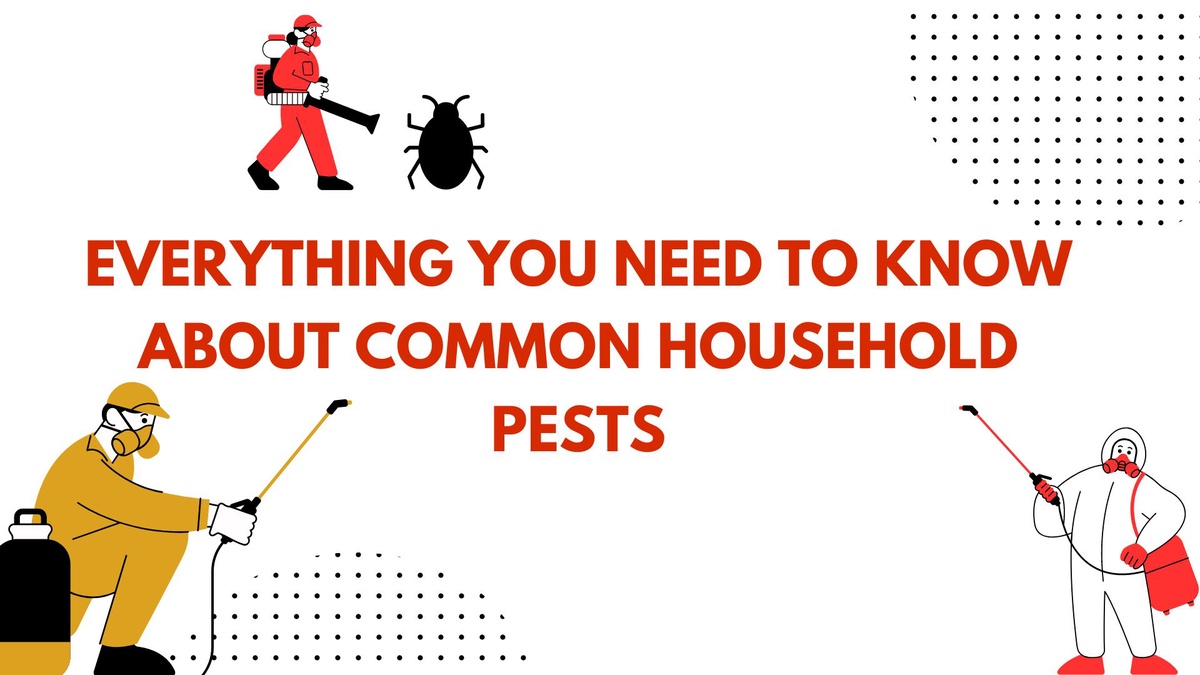As homeowners, we all know the frustration of finding pests in our homes. Whether it's mosquitoes buzzing around our ears, spiders lurking in the corners, or fleas making our pets itchy, these pesky critters can be a real nuisance. But beyond their annoyance factor, some household pests can also pose health risks or cause property damage. In this article, we'll explore some of the most common household pests, their habits and lifecycles, the harm they can cause, and how to prevent and control their infestations.
Mosquitoes
Mosquitoes are small flying insects that are known for their painful bites and ability to transmit diseases like malaria, dengue fever, and Zika virus. Female mosquitoes require blood to lay their eggs, and they are most active during dawn and dusk hours. Mosquitoes breed in standing water, so removing sources of stagnant water like flower pots, birdbaths, and gutters can help prevent their infestation. Wearing long-sleeved clothing and using mosquito repellent can also reduce the likelihood of bites.
Spiders
Spiders are eight-legged arachnids that are often found in dark and secluded areas like basements, attics, and closets. While most spiders are harmless, some species like the black widow and brown recluse can deliver venomous bites that require medical attention. Spiders feed on insects, so keeping your home free of other pests can discourage spider infestations. Sealing cracks and gaps in walls and windows can also prevent spiders from entering your home.
Fleas
Fleas are small, wingless parasites that feed on the blood of mammals, including pets and humans. Flea infestations can cause intense itching and skin irritation, and they can also transmit diseases like typhus and bubonic plague. Fleas lay their eggs in carpets, bedding, and furniture, and they can be difficult to eliminate without professional help, and this is the trickiest point. Regular vacuuming and washing your pet's bedding can help prevent flea infestations.
Cockroaches
Cockroaches are fast-moving insects that are notorious for their resilience and adaptability. They can survive for weeks without food and can even withstand exposure to radiation. Cockroach infestations can cause food contamination, trigger allergies, and exacerbate asthma symptoms. Cockroaches are attracted to moisture, so fixing leaky pipes and reducing clutter can help prevent their infestation. Traps and baits can also be effective in controlling cockroach populations.
Ants
Ants are social insects that live in large colonies and can quickly infest your home in search of food and water. While most ants are harmless, some species like the carpenter ant can cause structural damage to your home. Ants can be deterred by storing food in airtight containers and keeping your kitchen clean and free of crumbs. Any small gap could become a pathway for ants to enter, and they are difficult to prevent as they often appear unexpectedly. Therefore, it is necessary to seek professional help for a comprehensive inspection.
Silverfish
Silverfish are small, wingless insects that are often found in damp and humid areas like bathrooms and basements. They feed on starchy materials like paper, glue, and clothing, and their infestations can cause damage to books and clothing. Silverfish are attracted to moisture, so using dehumidifiers and fixing leaky pipes can help prevent their infestation.To avoid silverfish infestation in your stored clothing or paper items, it is recommended that you keep a fan in your attic or basement to facilitate air movement. Damp areas are highly appealing to silverfish, and having too many items in storage can create a breeding ground for these pests.
Bed bug
Bedbugs are small reddish-brown insects that feed mainly at night on human and animal blood. While bed bugs don't transmit disease, their bites can cause skin irritation and allergic reactions, as well as making people upset and sleep less well. To prevent bedbugs from affecting your life, it's important to keep your house clean and tidy, vacuum regularly, and fill in any cracks or crevices in the property promptly. You can also check bedding and furniture for signs of bedbugs, such as an unpleasant odor, black dots (bedbug droppings), and eggs.
Rats and mice
Rats and mice are small, furry rodents that can transmit diseases and cause damage to homes and businesses. They have similar lifecycles, reproduce quickly, and are nocturnal omnivores. They can chew through almost anything to gain access to food and shelter. Rats and mice can cause significant damage to homes and businesses by gnawing through wires, pipes, and insulation. They can also contaminate food and spread diseases. To prevent infestations, it is important to keep homes and businesses clean and free of clutter, seal any entry points, and remove sources of food and water. Traps and baits can be effective in controlling small infestations, but larger infestations may require professional pest control services.
Termite
Termites are small, pale insects that feed on wood and other cellulose materials. They are social insects that live in large colonies and can cause significant damage to homes and businesses if left untreated. Termites have a complex lifecycle, consisting of several stages, including egg, nymph, and adult. They can reproduce year-round and can consume up to 15 pounds of wood per week, making them a serious threat to property.
Termites cause damage to structures by eating away at wooden structures, which can compromise the structural integrity of homes and buildings. They can also damage furniture, books, and other wooden items. Prevention is key to avoiding termite infestations. This includes keeping your home or business free of moisture, sealing any cracks or crevices, and removing any sources of food and water. Regular inspections by a pest control professional can also help detect and prevent termite infestations. Treatment options for termite infestations include baits, barriers, and fumigation, and the best method will depend on the severity and location of the infestation.
In conclusion, pests can be a real headache for homeowners, but understanding their habits and lifecycles can help prevent and control their infestations. Keeping your home clean and free of clutter, fixing leaky pipes, and sealing. Finally, don't forget that you can rely on our professional GC Pest Control team to solve all your pest problems.


No comments yet